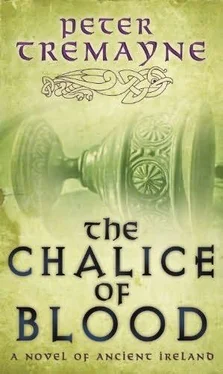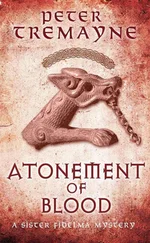Peter Tremayne - Chalice of Blood
Здесь есть возможность читать онлайн «Peter Tremayne - Chalice of Blood» весь текст электронной книги совершенно бесплатно (целиком полную версию без сокращений). В некоторых случаях можно слушать аудио, скачать через торрент в формате fb2 и присутствует краткое содержание. Жанр: Исторический детектив, на английском языке. Описание произведения, (предисловие) а так же отзывы посетителей доступны на портале библиотеки ЛибКат.
- Название:Chalice of Blood
- Автор:
- Жанр:
- Год:неизвестен
- ISBN:нет данных
- Рейтинг книги:5 / 5. Голосов: 1
-
Избранное:Добавить в избранное
- Отзывы:
-
Ваша оценка:
- 100
- 1
- 2
- 3
- 4
- 5
Chalice of Blood: краткое содержание, описание и аннотация
Предлагаем к чтению аннотацию, описание, краткое содержание или предисловие (зависит от того, что написал сам автор книги «Chalice of Blood»). Если вы не нашли необходимую информацию о книге — напишите в комментариях, мы постараемся отыскать её.
Chalice of Blood — читать онлайн бесплатно полную книгу (весь текст) целиком
Ниже представлен текст книги, разбитый по страницам. Система сохранения места последней прочитанной страницы, позволяет с удобством читать онлайн бесплатно книгу «Chalice of Blood», без необходимости каждый раз заново искать на чём Вы остановились. Поставьте закладку, и сможете в любой момент перейти на страницу, на которой закончили чтение.
Интервал:
Закладка:
Fidelma and Eadulf regarded Cunán in astonishment for a moment.
‘Are you saying that Brother Donnchad wrote this?’ Fidelma asked.
‘As I have just explained,’ Cunán said patiently, ‘I was the chief copyist of this library. Who does not know the hand of Brother Donnchad, one of the foremost scholars of this kingdom?’
‘Can you prove that it is his hand?’ pressed Eadulf. ‘After all, it is only a few words.’
‘Any good scholar who knew his work will tell you so. This is a good enough sample to spot the individual writer. Look at the words calicem and deicide . Brother Donnchad formed his letter “c” and the “d” in a very distinctive fashion. See there?’ His eyes lit up. ‘Why, I can prove it further, if you like.’
He stood up and hurried from the room.
Cumscrad smiled approvingly. ‘My son, Cunán, may not have the skills of governance to take over the chieftainship of the Fir Maige Féne but he has attended the bardic school for six years and achieved the degree of Cli , he knows the secret language of the poets, can recite the prescribed number of poems without fault and knows eighty of the ancient tales by heart.’
‘Then he is a son to be proud of,’ replied Fidelma just as the door reopened and Cunán returned holding a small scroll.
‘This was sent to me from Brother Donnchad some years ago and you can see clearly this formation on it,’ the young scribe explained.
Fidelma took it and examined it with interest. Cunán was correct. The same distinctive forms appeared in it. She could not help but read the opening: ‘Donnchad, a humble servant and an apostle of Christ, Jesus, to Cunán the scribe. Grace and peace be multiplied unto you through the knowledge of God and of Jesus our Lord.’
‘You knew him well, then?’ she asked.
‘Only by an exchange of letters. Our librarian knew him better,’ replied Cunán. ‘But he did ask me to copy some texts that we held.’
‘When was this?’ Fidelma asked.
‘Oh, long before he went off on his pilgrimage to the Holy Land.’
‘Can you remember what they were?’
‘Some letters of Paul the Apostle, as I recall.’
‘Nothing contrary to the Faith then?’ Eadulf sounded disappointed.
Cunán shook his head, then looked carefully at him. The young man was not lacking in wit.
‘Are you saying that there is some connection between the manuscript books he was examining here, his death and this attack on our library?’
‘Books that speak of things and people before the Faith might be enough to cause these things,’ intervened his father bitterly. ‘Look at the way we are condemned by that young upstart Brother Lugna.’
‘But it doesn’t explain why the Uí Liatháin would attack ourlibrary or the barge taking the books to Ard Mór,’ pointed out Cunán.
‘That is true, Cunán,’ said Fidelma after a moment or two of thought. ‘I would like to speak to the bargemen about the attack on them and also to the man who found the barge.’
‘Very well,’ Cumscrad said, rising abruptly. ‘Let us find Muirgíos.’
Muirgíos, as befitted someone whose name meant ‘sea strength’, looked every inch the sort of person whose profession had to do with the sea or the waterways. He was a stocky individual with sandy hair, sea-green eyes, and a weather-beaten face, and he had a habit of standing with his feet wide apart as if balancing on the deck of a ship. They found him on board one of the broad river barges that traded along The Great River. He was mending some of the rigging on the vessel.
He greeted Cumscrad with a gesture of his chin towards the still smouldering library building.
‘A bad business. The Uí Liatháin have over-reached themselves this time.’
Cumscrad did not reply but indicated Fidelma.
‘This is the Lady Fidelma, sister to Colgú. She has come to hear our complaint.’
It was clear that Muirgíos was not impressed for he did not rise from his seat nor interrupt his work on the rigging.
‘Then you have come at the right time. Now you can see their viciousness for yourself.’
‘At the moment, it is the attack on your barge that I want to talk about,’ she replied, ignoring Gormán’s look of outrage at what he saw as the man’s discourtesy towards the King’s sister.
‘It is as we told our chieftain, Cumscrad,’ the man replied. ‘We were not far from Lios Mór when we saw a man lying on the southern bank of the river. He appeared to be in distress. So we pulled towards the bank. It was a ruse. The next moment,without warning, an arrow struck our steersman. Then warriors appeared from behind the trees and bushes and swarmed over the side. One of our men injured one of the attackers in the arm with his knife. But we were not armed as warriors. No reason to be. So we surrendered.
‘Our steersman was badly hurt but is now recovering. The crewman who caused injury to one of the attackers was beaten severely. They took us from the barge and bound us, leaving us on the river bank. Then they sailed off downriver. It was as simple as that.’
‘How did you know that they were of the Uí Liatháin?’ asked Eadulf.
The bargeman laughed bitterly. ‘You are a stranger, judging by your accent. Well, it is easy to tell, stranger. Firstly, you should know that each clan has its own symbol, its own totem. The banner of the Uí Liatháin is the head of a grey fox on a white background. That banner was carried by one of those who attacked us.’
Eadulf nodded slowly and then said, ‘And what else?’
The bargeman frowned. ‘What else?’
‘You began by saying “firstly” as you explained about the banner. I presumed there was a second point.’
‘Well, you’re right. As they were leaving us, one of them said loudly to his companion, “Uallachán will be pleased.” Uallachán is-’
‘We know who Uallachán is,’ Fidelma said quickly. ‘Can you remember the features of any of these raiders, anything distinctive? ’
The bargeman regarded her curiously and shook his head. ‘Nothing particular.’
‘Was there a bánaí with them, a thin man with white hair and-’
‘I know well what a bánaí is. I heard that one of the raiderswas shot this afternoon and he was one. I cannot swear he was among those who stole the barge. All I know is that they were men of the Uí Liatháin.’
‘Did you not consider it strange that these thieves made no attempt to hide their identity?’
The bargeman shrugged indifferently. ‘All that is bad in this area is down to the Uí Liatháin. They have always had their eye on our fertile lands. It is not the first time they have crossed north over the Bríd River into our territory to attack and rob us.’
‘Yet it is curious that they should do so openly. They know such attacks would bring down the wrath of my brother and his warriors.’
‘Maybe they have no fear of the King at Cashel,’ Muirgíos commented dismissively. ‘He sits far away in a comfortable palace.’
There was a sharp intake of breath from Gormán and his hand gripped the hilt of his sword. Fidelma motioned with her hand to still him.
‘It is well known that the Eóghanacht of Cashel are not well favoured by either the Uí Liatháin or the Fir Maige Féne. Nevertheless, Colgú is the King and you are both answerable to him. If the Uí Liatháin are in open rebellion then they must face the consequences — as, indeed, will any of the clans of Muman who disobey the law.’
Muirgíos stared in surprise at the authority in her voice.
Then Cumscrad interrupted the awkward silence by calling to a passing man to come aboard.
‘This is Eolann, the man who found the missing barge.’
Читать дальшеИнтервал:
Закладка:
Похожие книги на «Chalice of Blood»
Представляем Вашему вниманию похожие книги на «Chalice of Blood» списком для выбора. Мы отобрали схожую по названию и смыслу литературу в надежде предоставить читателям больше вариантов отыскать новые, интересные, ещё непрочитанные произведения.
Обсуждение, отзывы о книге «Chalice of Blood» и просто собственные мнения читателей. Оставьте ваши комментарии, напишите, что Вы думаете о произведении, его смысле или главных героях. Укажите что конкретно понравилось, а что нет, и почему Вы так считаете.











